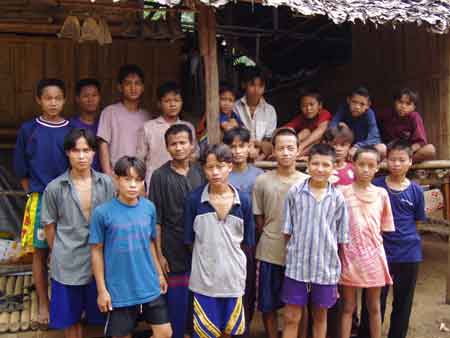Social Issues
|
Social issues in the camp, you ask? Well, besides
the fact that each person who lives in the camp is a refugee and
has been displaced from their homeland, there are many secondary
problems that occur because of this displacement. Some of these
issues include an increase in the use of drugs and alcohol; and
in the larger refugee camps there are youth gangs that are forming.
Lack of income is a pervasive issue for those living in the camps. Basic food and some of their personal necessities (mosquito nets, cooking charcoal, a charcoal stove, one pot per family, sleeping mats, medicine - usually) are provided, but they also have other needs that include candles, umbrellas, shoes, school fees, school uniforms, and more nutritious food when a person in the family is sick. There is desperation for a bit of extra money, and most people do not have any way to earn it. There are only a few paying jobs available. The lack of income causes stress and tension, which in turn can lead to an increase in interpersonal conflicts. There are a number of reported cases of domestic violence in the camps. It has been noted that in situations of war or social upheaval domestic violence tends to increase because men feel that they are unable to fulfill their role as protector and provider (World Health Organization Report, 2002). Research has not been done on this with the Karen, but it seems to be true. The community is increasingly concerned about this issue, and in the last two years a few of the camps have established safehouses where women can go to be safe.
There are many orphans in the camps; they continue to arrive from the areas in Burma where there is conflict (above picture). They carry with them very recent scars from the terror that they have endured. For everyone in the camp there always looms the knowledge that relatives and others living inside of Burma, only kilometers away, continue to live and die with extremely limited food and no access to medicine. To help deal with these and other social problems, the leadership in some of the camps has begun a social welfare program. Beginning two years ago, men and women have been chosen to be “Home Visitors”or Social Welfare Workers. They do whatever they can to assist individuals or families with social problems which they are unable to solve on their own. However, the Social Welfare Workers have not received any formal job training. While some of the workers are naturals at de-escalating conflict, most find it awkward to step into the middle of somebody else’s personal issue. UNHCR recently gave a two-day training on sexual and gender-based violence (including women’s rights, domestic violence, rape), which has given the workers more confidence. But they are in need of more training. The “Social Welfare Worker Training” that I (Angela) was able to facilitate came at a perfect time. Read on the next page about the training. |
